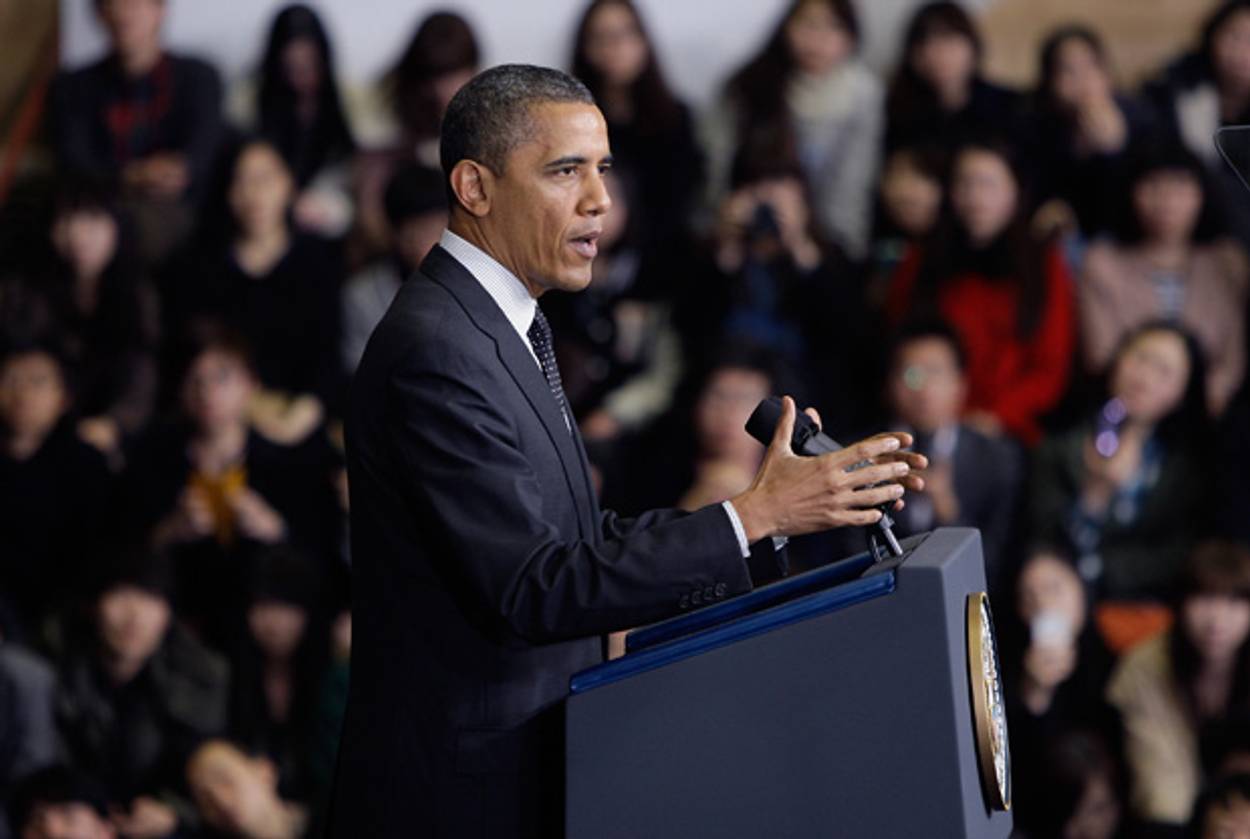Will Obama’s ‘Flexibility’ Gaffe Affect Israel?
President states the obvious: second term could bring renewed pressure




President Obama’s last “open mic” gaffe—in which he told the sort of truth that world leaders prefer to keep in private, only it was unknowingly picked up by an audio recorder—was damaging to the perception that he was a friend to Israel: When French President Nicolas Sarkozy called Prime Minister Netanyahu a “liar,” Obama responded, “You’ve had enough of him, but I have to deal with him every day.” His most recent open-mic gaffe, by contrast, contained nothing explicit about Israel. Yet it could arguably do even more damage to the president’s reputation on that subject. Yesterday, Obama privately—or so he thought—asked Russian President Sergey Medvedev for “space” when it came to missile defense, explaining, “This is my last election. After my election I have more flexibility.”
Because it’s an election year, Obama has soft-pedaled his objections to an Israeli attack on Iran’s nuclear program; his administration has expressed the more strident forms of its opinion, which is against a strike, through anonymous sources in news articles. He has not really exerted much pressure on Israel regarding the Palestinians for almost a year, and it seems clear he does not intend to for some time. It seems pretty clear that the election is what is holding Obama back from pushing harder for Israeli concessions, as he did in his first years, and perhaps also from more clearly speaking out against an attack on Iran. “Nearly impossible for Obama to punish Israel before election,” tweeted Jeff Goldberg recently. A supporter, broadly speaking, as well as someone with a ton of access, Goldberg was expressing a widely held, as well as commonsensical, notion. Asked what the next step for the peace process could be, Goldberg replied, in another tweet, “The old-fashioned approach: Convincing both sides what’s in their best interests. Obama, if he wins reelection, might try.” I’ve made the same argument to friends (and am now making it to you), also in a mordantly hopeful tone. Given how I feel about the situation, I would hope that if re-elected, the president, while learning from his mistakes (even John Kerry admitted that focusing on settlements was unwise), would endeavor to get Israel as well as the Palestinians back to talks.
Even Obama admitted it! “The only way I get this stuff done is if I’m consulting with the Pentagon, with Congress, if I’ve got bipartisan support,” Obama said this morning. “And frankly, the current environment is not conducive to those kinds of thoughtful consultations.”
But that doesn’t mean it isn’t fair game. It was barely noon yesterday before Mitt Romney’s campaign blasted an email imagining what else Obama might do with more “flexibility” in a second term: raise taxes; push for a cap-and-trade bill (may it be true!); and … “President Obama Has Hinted That The Palestinians Should Wait For Statehood Negotiations Until His Second Term.” The talking points—which the campaign referred me to when I requested comment on the gaffe—cite one report that the Palestinian Authority’s foreign minister said that Obama has told the Palestinians to wait out the election year for a renewed push in 2013. Whether he ever said this or not, it’s a reasonable supposition. Gaffes are inconvenient truths given voice.
In an interview yesterday, Romney focused mainly on the comment’s bearing on Russia, which he called the United States’ “number one geopolitical foe,” in turn prompting a barrage of criticism from Obama supporters who suggested Romney’s foreign policy, in the words of one, “is left over from last century.” At an event, Romney did draw the Israel connection, arguing, “This is no time for our president to be pulling his punches with the American people, and not telling us what he’s intending to do with regards to our missile defense system, with regards to our military might and with regards to our commitment to Israel and with regard to our absolute conviction that Iran must have a nuclear weapon.”
The Obama Administration did not respond to a request for comment.
Gil Kahn, a political scientist and blogger, notes that the freedom of a second term comes along with a hangover. “Obama’s political flexibility is understood, but so would be his weakened ability to control or discipline even members of his own party,” Kahn argues. “It is in foreign policy that presidents usually keep the most power as so much authority adheres to the office of the president in this arena.” In other words, he may walk, talk, and act like a duck, but he’ll be a lame duck.
Like this article? Sign up for our Daily Digest to get Tablet Magazine’s new content in your inbox each morning.
Sarkozy to Obama: Netanyahu Is a Liar [ABC News]
Obama Asks Russia For ‘Space’ Through Election [Politico]
In U.S. Election Year, Palestinians Sidelined [AP]
Whoops!!! Again [NJJN Kahntentions]
Marc Tracy is a staff writer at The New Republic, and was previously a staff writer at Tablet. He tweets @marcatracy.